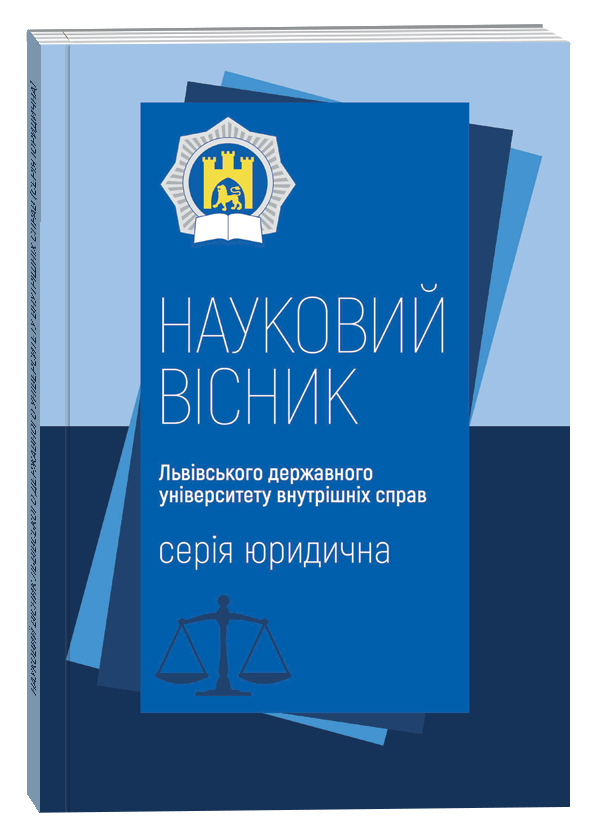OPTIONAL SIGNS OF THE SUBJECTIVE SIDE OF THE COMPOSITION OF A CRIME UNDER THE CURRENT CRIMINAL CODE OF UKRAINE
DOI:
https://doi.org/10.32782/2311-8040/2025-2-13Keywords:
Criminal Code, way of commission a crime, body of the crime, facultative elementsAbstract
The article is devoted to clarifying such elements of the subjective side of a crime as motive and purpose. It analyzes how this issue is addressed in the current Criminal Code of Ukraine. Examples of definitions for the concepts of motive and purpose of a crime are provided. The article differentiates cases where the presence of a motive or purpose indicates qualifying or especially qualifying features of a criminal offense. It outlines situations where the existence of a motive or purpose increases the social danger of the act committed and directly affects the legal assessment of the act. The influence of motive and purpose on distinguishing between different socially dangerous acts is demonstrated. Attention is drawn to the fact that the indication of purpose in committing a criminal offense points to the presence of direct intent. It is noted that motive and purpose as elements of a crime refer to one another. The article lists cases where criminal motives are important for the qualification of a crime and differentiates cases where criminal purpose plays a role in qualification. Examples are provided where motive and purpose are not explicitly mentioned, which means their absence as elements not considered in the legal assessment of certain socially dangerous acts, along with exceptions to this rule. In particular, it highlights cases where, despite the absence of explicit legislative reference to a particular motive or purpose, they axiomatically follow from the analysis of other elements of the criminal offense. It is shown that situations arise where a person may act under various motives, making it essential to determine which one was decisive. It is stated that during the qualification process, motive and purpose can be established only in intentional crimes, and relevant examples are provided. There are situations where the absence of a specific motive or purpose leads to a different legal assessment of the act. Cases of unclear purpose during the commission of a crime and the accompanying qualification challenges are presented. Finally, examples from judicial practice, particularly from Supreme Court rulings, are given where the motive or purpose of committing a crime plays a key role in its qualification. Notably, the article points out situations where the highest judicial body in the system of general jurisdiction courts clarified its position or expressed the irrelevance of establishing a particular motive.
References
Ус О.В. Теорія та практика кримінально-правової кваліфікації : лекції. Харків, 2018. 368 с.
Про судову практику в справах про хуліганство : постанова Пленуму Верховного Суду України від 22 грудня 2006 року № 10. URL: http://zakon.rada.gov.ua/laws/show/va010700-06 (дата звернення: 07.04.2025).
Постанова Верховного Суду від 10 листопада 2020 року у справі № 442/66/16-к. URL: https://reyestr.court.gov.ua/Review/92902851 (дата звернення: 07.04.2025).
Брич Л.П. Теорія розмежування складів злочинів : монографія. Львівський державний університет внутрішніх справ, 2013. 713 с.
Ус О.В. Кваліфікація злочину за ознаками суб’єктивної сторони складу злочину. Науковий вісник Ужгородського національного університету. Серія : Право. 2018. Випуск 49. Том. 2. С. 130–136.
Про судову практику в справах про злочини проти життя та здоров’я особи : постанова Пленуму Верховного Суду України від 7 лютого 2003 р. № 2 / Верховна Рада України. URL: https://zakon.rada.gov.ua/laws/show/v0002700-03#Text (дата звернення: 07.04.2025).
Постанова Верховного Суду від 16 березня 2021 року у справі № 631/2135/16-к. URL: https://reyestr.court.gov.ua/Review/95682116 (дата звернення: 07.04.2025).
Габуда А.С. Відмежування злочину, передбаченого ст. 342 КК України, від суміжних діянь. Науковий вісник Національної академії внутрішніх справ. 2016. № 3 (100). С. 207–218.
Постанова Верховного Суду від 21 жовтня 2021 року у справі № 596/1688/18 URL: https://reyestr.court.gov.ua/Review/100614149 (дата звертання 18.04.2025).
Постанова Верховного Суду від 02 червня 2020 року у справі № 229/3178/15-к. URL: https://reyestr.court.gov.ua/Review/89793549 (дата звертання 18.04.2025).
Постанова Верховного Суду від 20 жовтня 2020 року у справі № 444/2115/17. URL: https://reyestr.court.gov.ua/Review/93014930 (дата звернення: 20.01.2025).
Постанова Верховного Суду України від 11червня 2024 року у справі № 359/2636/19 провадження № 51-7397км23. URL: https://reyestr.court.gov.ua/Review/119873523 (дата звернення: 21.04.2025).









